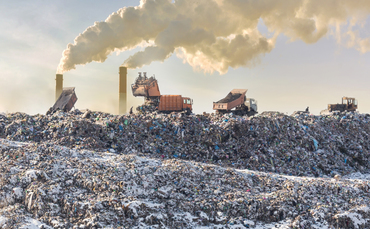
Calls are growing for nations to sign an historic global treaty to tackle plastic pollution at a UN Environment Assembly conference due to take place in Nairobi this Spring.
In a new report published this morning, the Environmental Investigation Agency urged officials attending the talks to develop an ambitious international agreement to crackdown on plastic pollution that covers the whole lifecycle of plastics, from production through to waste management.
Dubbed Connecting the Dots: Plastic pollution and the planetary emergency, the report argues that plastic pollution must be treated alongside biodiversity loss and climate change as a planetary emergency. Plastic pollution is set to triple by 2040, it notes, with the weight of plastic in the seas by that date estimated to be on track to exceed that of all the fish in the ocean.
“There is a deadly ticking clock counting swiftly down,” said EIA Ocean Campaigner Tom Gammage. “The damage done by rampant overproduction of virgin plastics and their lifecycle is irreversible – this is a threat to human civilisation and the planet’s basic ability to maintain a habitable environment.”
Discussions about a global pact to cut plastic pollution are expected to dominate the agenda of a UN Environment Assembly 5.2 (UNEA 5.2) conference in April.
While more than two thirds of UN member states have said they support a treaty on plastic pollution, it remains unclear whether any pact will target the production of plastics, an intervention that is like to face major pushback from oil and gas and chemicals firms, as well as countries that export plastic.
The EIA has warned that decision makers attending the conference should move away from a “reductionist litter focus” and instead adopt a full lifecycle approach that tackles all aspects of plastic pollution, from production through to product design and waste management.
The report is published on the same day that more than 70 companies signed an open letter calling for a treaty on plastic pollution that includes “both upstream and downstream policies”.
Among the signatories to the letter are Coca-Cola, Nestle, and PepsiCo, the consumer goods giants that have been identified as the world’s top plastic polluters for three years running by the Break Free From Plastic Campaign.
Other consumer goods brands and retailers to have signed the letter include Mars, P&G, Unilever, Mondelez International, Ikea, Walmart, and Danone, alongside a raft of financial institutions, such as Federated Hermes, BNP Paribas Asset Management, Armundi Asset Management, and Robeco.
“We are at a critical point in time to establish an ambitious UN treaty that fosters collaboration for systemic solutions and speeds up the transition to a circular economy globally,” the letter states. “UNEA 5.2 is the decisive, most auspicious moment to turn the tide on the global plastic pollution crisis. We cannot afford to miss it.”
